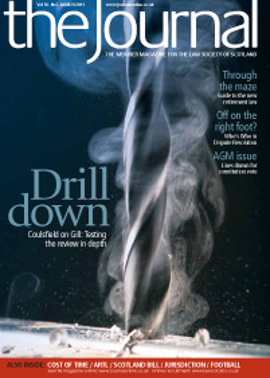Keeping a grip on cash

The good news is that despite a fall in profits last year, the firms taking part in the 2010 Cost of Time Survey succeeded in improving their bank position and reserves, and in reducing the amounts tied up in working capital.
When work levels suddenly fall it can take some time to adjust salaries, overheads and partner drawings so as to restore a firm’s cash position, and chart 1 summarises the improvement that took place last year.
Firms of 10 or more partners saw their median bank balance reverse from being nearly £300,000 overdrawn to being positive once again. Other firms also improved their cash position, although average levels are still below those that prevailed in 2004 to 2008.
Chart 1
(see pdf version)
Much of a firm’s working capital is accounted for by debtors and also outlays that have to be funded on behalf of clients and charts 2 and 3 illustrate how these also improved last year.
Chart 2
(see pdf version)
For some firms the amounts outstanding per fee earner will have fallen due to lower work levels. However, the survey suggests that firms have become better at getting clients to pay.
Chart 3
(see pdf version)
Cash management is going to continue to be key through 2011 as the economy continues to be difficult. The risk of business failure continues to be high, and risk management should be high on any firm’s list of priorities.
There is a particular danger that fee earners under pressure to maximise their fees will take on clients who may not be able to pay. Risk management is an area where many firms are weak – it is good practice (as set out in the Lexcel Quality standard):
- to identify a named supervisor for each area of work the firm undertakes;
- to maintain lists of work the firm will and will not undertake, together with the generic risks and causes of claims associated with each area, and make sure this is fully communicated to staff;
- for each fee earner to undertake an opening risk assessment for each new matter against these criteria.
Experienced lawyers instinctively do this – and will know when a new client or matter doesn’t feel quite right, but a new fee earner who lacks the equivalent experience may not. Require each fee earner to indicate on the file that they have undertaken an opening risk assessment, and that in particular they have considered whether the client will be able to pay.
The better run firms are ever tougher on making sure they get paid – and your client will often respect you more for being so. Some of you will have read our previous guidance, but it is no bad thing once again to remind you to:
- Ensure you are clear in your initial engagement letter about likely fees; that you will issue interims; that you will issue your final bill promptly; and that you will expect payment within x days.
- If it is a commercial client check their credit rating. If it is a longstanding client, check it again as it may have changed from last month.
- Send regular interims – monthly if the matter is significant, quarterly for all other matters. Clients prefer to know where they are, and it avoids surprises at the end, and of course it helps your cash flow.
- Bill promptly at the end of the matter and let the client know it is coming. The fee earner should speak to the client and explain if the bill is different to what has been discussed previously.
- Let your cashroom chase for payment. Don’t interfere or hamper them.
- Do everything you can to avoid bad debts. Any increase in bad debts will come straight off your bottom line profits.
Drawings: the line
For the last three years we have written about the need to keep partner drawings in line with profits. It is very encouraging to see that although 2010 saw profits fall for most firms, partner capital actually increased for many, in particular for 2-4 and 10+ partner firms. Chart 4 illustrates the improvement:
Chart 4
(see pdf version)
It is also worth remembering that for most firms the two points when cash will be under greatest strain over the next 12 months will be when partner tax has to be paid in July 2011 and in January 2012. For some firms, these will coincide with VAT quarters and rent payments, and for a few the combination will push them into difficulty. To minimise the risk, areas to consider continue to be:
- adjusting partner drawings to the levels of profit you are now forecasting;
- retaining part of these drawings within the firm to cover partner tax;
- transferring an amount each month into a separate deposit account in respect of partner tax, so you have the money already put to one side;
- transferring an amount each month in respect of VAT so once again you have the money put to one side each quarter (very small firms may also wish to discuss the merits of the Flat Rate VAT scheme with your accountants: see www.hmrc.gov.uk/vat/ account-flat.htm#6).
The key is to tackle these areas before your bank tells you to. You should also avoid any partner current accounts becoming overdrawn – make sure that any overdrawn balances are rectified – and keep in touch with your bank. Make sure they know what is happening.
Taking part: the benefits
All participating firms receive a free copy of “The 2010 Survey of Law Firms in Scotland”, the detailed report upon which this article is based. They also receive a free confidential individual report. Other firms can obtain a copy of the full report, which contains a wide range of useful statistics and performance indicators, from the Professional Practice Department at the Society on 0131 476 8164 (mail to: profprac@lawscot.org.uk).
In April the President will be writing to all firms inviting them to participate in the 2011 survey. Participation is free and carries a three-hour CPD credit as well as an individual report on cost rates in the firm and a copy of the survey report. In recent years there has also been a prize draw. Last year the £700 prize was won by Saul Kleinglass of Frederick & Co in Glasgow. The Society is again grateful to Alex Quinn and Partners for sponsoring the prize in 2010.
In this issue
- The case for full disclosure of laboratory case files
- Why join the Scottish Family Law Association?
- Above board
- Time to be counted
- Taking out rejections
- Updating the constitution
- Every bit helps
- Retiring the default age
- Keeping a grip on cash
- Watch this space
- The diehards
- Win-win ways
- "Virtual fair" opens for career options
- Law reform update
- Society's in-house work under scrutiny
- Watching over the constitution
- All aboard life's U-bend
- Ask Ash
- Working to advantage
- Frauds and scams beware
- Lay help... official
- Lacuna manufacturing
- This time it's NOT personal
- Fairness and trust
- Pensions: redefining value
- Sharing the spoils
- World IP Day 2011 approaches
- Life v reputation
- Book reviews
- ARTL, by degrees
- Contaminated land - the story continues






